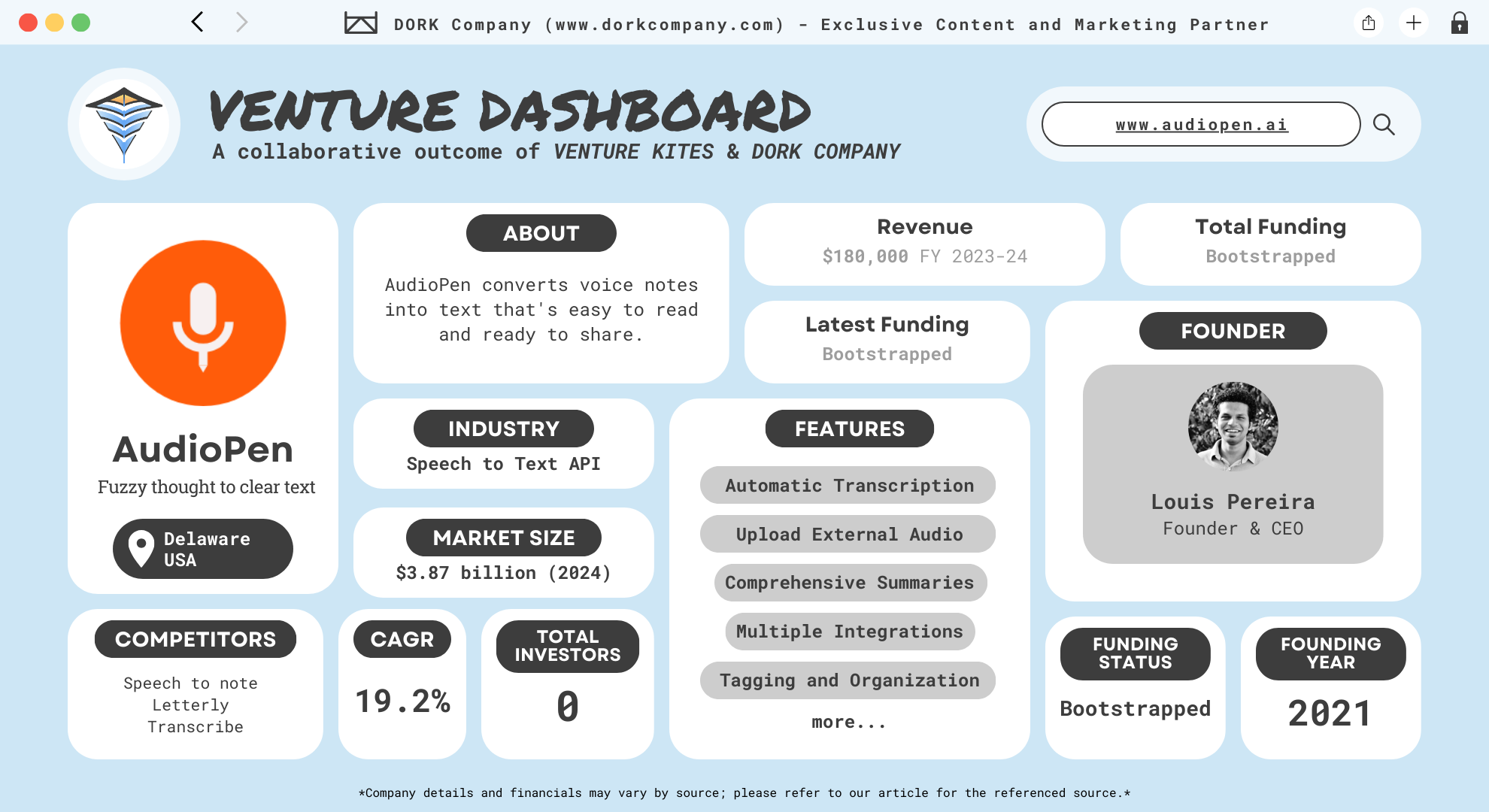Audio Pen : A Startup Built in 12 Hours

Audio Pen turns your messy, half-formed thoughts into organized, clear notes with just your voice. It’s the perfect tool for anyone who thinks faster than they type and struggles to get their ideas down in an organized way.
Speak Now, Organize Later
AudioPen AI takes your spoken words and transforms them into structured text—like having your own personal transcription assistant. It’s a web-based app that uses advanced AI to turn your voice memos into readable and organized notes. Unlike traditional voice recorders, AudioPen cleans up your speech by removing filler words and pauses, making sure the final text is polished and easy to read. (Audio Pen)
This tool is designed for people who need to quickly capture ideas, be it students, journalists, writers, or professionals in meetings. It fits seamlessly into daily workflows, saving you time by handling the laborious task of writing notes from scratch. The app’s simplicity is its strength; all you need to do is speak, and AudioPen does the rest.
What makes it even more exciting is its user-friendly design. With just a few clicks, you can start recording, and the app organizes your notes with minimal effort. It’s a tool designed for productivity—especially when you need to process thoughts fast but want them to be understandable later on.
The Accidental Pen-trepreneur : How a Half-Day Hackathon Turned into a Full-Time Success
Louis Pereira didn’t set out to build the next big AI tool—but he did it anyway. With no formal technical background, Louis ventured into the world of AI in 2021 and created AudioPen, a simple yet powerful app that turns spoken words into clean, organized text. His journey is proof that you don’t need to be a coding expert to create impactful tech products. (Louis Pereira)
He has a fascinating journey marked by experimentation and resilience. He comes from a non-technical background, having studied economics and worked in consulting before turning his attention to building digital products. He initially attempted various business ventures, including real estate, which didn’t meet his expectations. He eventually returned to his family business in Goa, India, but he continued pursuing his passion for creating web-based tools in his spare time.
He started this project as a solo entrepreneur, bootstrapping his way through. Instead of seeking venture capital funding, he chose to rely on accessible AI tools, particularly large language models (LLMs) like those developed by OpenAI. These models allowed him to create a highly functional product without needing a large team or massive budget.
Despite starting as a side project, AudioPen quickly gained traction thanks to its simplicity and usefulness. Louis built AudioPen while sharing his progress online, a method known as “building in public.” This transparency helped him attract a small but supportive community of early adopters, who provided feedback and helped spread the word about his product. Initially priced low, AudioPen gained traction after launching on Product Hunt, eventually amassing over 1,000 paying users in a short period of time.
Speech to Text Market: Talk is Big Business
The speech-to-text API market is experiencing explosive growth, driven by advances in AI and the increasing demand for voice-enabled technologies. In 2024, the market was valued at a $3.87 billion, growing at an impressive compound annual growth rate (CAGR) of 19.2%. It is expected to reach $7.66 billion in 2028. This rise is fueled by the rapid adoption of voice-activated devices, AI assistants, and accessibility tools across industries such as healthcare, education, and customer service. (The Business Research Company)
One of the biggest drivers behind this surge is the growing need for accessibility solutions. Speech-to-text tools are becoming essential for providing equal access to content for people with disabilities, including those with hearing or visual impairments. From real-time transcription in classrooms to AI-enhanced customer service applications, these tools are transforming how we interact with technology.
Another key factor is the integration of AI and natural language processing (NLP) into smart devices. With more consumers using virtual assistants like Siri, Google Assistant, and Amazon Alexa, the demand for accurate and efficient speech-to-text systems has skyrocketed. Companies like Microsoft, Google, and IBM are leading the charge in improving these technologies, enabling smarter interactions in everything from home automation to legal transcription.
Moreover, industries such as healthcare are reaping the benefits of speech-to-text tools, especially for improving clinical documentation and patient care. These tools are streamlining workflows by automatically transcribing medical notes and consultations, reducing the burden on healthcare professionals.
Inside AudioPen : Pen Is Mightier When It’s Powered by AI
Founded by Louis Pereira, AudioPen is designed to solve the age-old problem of converting unstructured spoken ideas into organized text. Its mission is simple: to provide users with an intuitive, AI-powered tool that listens to their thoughts and turns them into readable, shareable notes.
The vision of AudioPen is to democratize access to efficient voice-to-text technology. Their goal is to make thought organization easy for everyone—whether you’re brainstorming ideas, journaling, or taking notes in meetings. By using advanced AI and natural language processing, AudioPen makes the process of capturing and refining thoughts effortless.
Problems they solve: AudioPen addresses the common issue of losing valuable ideas because of the gap between thinking and writing. It removes filler words, organizes ideas into coherent notes, and helps users stay productive. Whether you’re a student, a professional, or a creative thinker, AudioPen ensures that your voice can be transformed into structured text instantly.
Business model: AudioPen operates on a freemium model, with a free version offering basic transcription features and a premium version, AudioPen Prime, providing additional capabilities like longer recordings, custom summaries, and enhanced note organization. This model has allowed them to rapidly grow a base of paying users.
From Voice to Victory: AudioPen’s Power-Packed Features Explained
This AI-powered web app transforms jumbled voice notes into neat, organized text that’s ready to use. Whether you’re capturing thoughts on the go, brainstorming for a blog, or preparing meeting notes, AudioPen makes it all effortless.
Basic Features:
- Automatic Transcription: AudioPen transcribes voice notes into clear text. It eliminates filler words, corrects grammar, and organizes your thoughts into coherent sentences.
- Supports Live and Pre-recorded Audio: Whether you’re recording on the fly or uploading pre-recorded files, AudioPen can handle both.
- User-Friendly Interface: Designed for users of all skill levels, no technical knowledge is needed to get started.
Premium Features (AudioPen Prime):
- Extended Transcription: With AudioPen Prime, you can transcribe up to 15-minute voice recordings, compared to the free version’s 3-minute limit.
- Upload External Audio: Don’t want to use the in-app recording? You can upload your own audio files for transcription.
- Super Summaries: This feature allows you to combine multiple notes into one comprehensive summary, making it perfect for brainstorming sessions or long-form content creation.
- Custom Writing Styles: You can choose to have your notes rewritten in the style of famous bloggers or authors, adding a unique flair to your transcriptions.
- Tagging and Organization: Users can add tags to their notes for better organization and easy retrieval.
Integrations: AudioPen also supports Zapier integrations, allowing you to automatically send transcriptions to tools like Notion, Google Docs, or other productivity platforms.
Free vs. Premium (AudioPen Prime)
Free Version: The free plan allows you to record up to three minutes of audio per note and store ten notes per month. It’s great for quick voice memos or short bursts of inspiration.
AudioPen Prime: The premium plan ($60/year or $120/lifetime) unlocks a ton of features. It increases the recording limit to 15 minutes and offers unlimited note storage. You can also upload audio files for transcription, with up to 30 uploads per month, making it ideal for professionals or students with heavier note-taking needs.
Talk the Talk, Then Walk Away: AudioPen Does the Rest
Users have praised AudioPen for boosting creativity, especially in fields like writing, journalism, and education. With a stellar 4.9/5 rating on platforms like Product Hunt, the tool has garnered a loyal user base of over 1,500 paying customers, from writers to entrepreneurs. With more than 20,000 users and a growing base of premium customers, AudioPen’s market presence is steadily growing.
One key area of collaboration has been its integration with OpenAI’s technology. AudioPen uses OpenAI’s advanced language models to power its transcription and note organization features. Additionally, AudioPen has integrated with Zapier, a tool that allows users to automate workflows. Through this collaboration, AudioPen users can send their transcriptions and notes directly to platforms like Notion, Google Docs, or other project management tools.
Bootstrapped and Booming: The AudioPen Profit Power Play
AudioPen didn’t need millions in venture capital to make a big splash—it’s a bootstrapped success generating over $15K per month. Founded by Louis Pereira, AudioPen was built during a half-day hackathon and started generating revenue from day one. Without external funding or a large team, Pereira managed to keep costs low while delivering a product that resonated with thousands of users. AudioPen currently serves over 1,500 paying customers.
Pereira’s strategy revolves around lean operations. By relying on tools like Bubble.io for development and Figma for design, he minimized expenses and invested in key technologies that directly improved user experience. This scrappy approach allowed AudioPen to grow quickly, reaching profitability without needing to spend on advertising or external marketing.
Today, AudioPen generates $15,000 per month in revenue with a 70% gross margin, all while being run by a one-man team. This remarkable success story proves that with the right product-market fit, even a solo founder can build a thriving business without venture capital.
Don’t Just Talk About It, Build It: Your Idea Could Be the Next AudioPen
AudioPen is a remarkable example of how a simple idea can evolve into a powerful tool. It started as an accidental project by Louis Pereira, but quickly found its place in the market. With no venture capital and minimal operating costs, AudioPen stands out as a lean, profitable business built purely on customer value.
The app has transformed note-taking by offering an intuitive and efficient way to transcribe and organize thoughts. Its seamless integration with platforms like Zapier and its use of OpenAI’s advanced technologies make it a versatile tool for professionals, students, and creators alike.
By addressing the common problem of disorganized thoughts and cumbersome note-taking, AudioPen continues to empower its users, making their workflows more efficient and creative. Its steady growth, fueled by word-of-mouth and constant updates, shows that innovative products don’t always need big budgets—just a big impact.
If you’ve been sitting on an idea, now is the time to take action. Whether it’s a side project or the next big startup, get it out there. Who knows? You might be the next success story like Louis Pereira. Want more inspiration? Check out our other articles on Venture Kites and dive into stories of other thriving startups. You’ll find ideas, motivation, and strategies to help you bring your vision to life.
At a Glance with DORK Company

Dive In with Venture Kites
Lessons From Audiopen
Build a Community Around Your Product
The Lesson & Why It Matters
A loyal community can be your biggest asset. Engaged users provide ongoing feedback, promote your product, and create a sense of belonging.
Implementation
Engage with your users on social media and involve them in your product’s journey. Share behind-the-scenes updates and listen to their input.
How AudioPen Implements It
Louis regularly interacts with his Twitter followers, sharing the development process and asking for input. This transparency has helped build a strong community of loyal users.
Enjoy the Process
The Lesson & Why It Matters
Passion drives persistence. Building a product is challenging, but loving the process helps you push through tough times and stay motivated.
Implementation
Focus on the parts of the business you enjoy. If you’re excited about what you’re creating, you’ll be more resilient when challenges arise.
How AudioPen Implements It
For Pereira, building AudioPen wasn’t just about creating a product—it was about enjoying the journey of building something useful. This passion has fueled his continuous work on the app.
Build with Intentional Simplicity
The Lesson & Why It Matters
Simplicity sells. Overloading users with features dilutes the core value of your product. Focus on solving one problem well.
Implementation
When building your MVP, prioritize essential features. Avoid feature bloat until the core product is refined and validated.
How AudioPen Implements It
AudioPen initially focused on just converting voice to text with minimal distractions. This focus on simplicity drew users in, establishing a strong product-market fit.
Bootstrap with Purpose
The Lesson & Why It Matters
You don’t need a huge budget to build a successful product. Bootstrapping forces you to focus on sustainability early.
Implementation
Leverage affordable tools and resources. Spend on what enhances the product experience, and avoid unnecessary expenses.
How AudioPen Implements It
Founder Louis Pereira built AudioPen on a no-code platform, Bubble.io, minimizing costs and making the product profitable from day one.
Engage Users in Product Development
The Lesson & Why It Matters
Your users are your best product testers. Involving them early in the process provides invaluable feedback and helps build loyalty.
Implementation
Offer beta access and regularly ask for feedback. Use this input to iterate on your product and prioritize features.
How AudioPen Implements It
AudioPen’s early adopters were instrumental in shaping its development. Their feedback helped refine features like “super summaries” and enhanced note organization.
Author Details
Creative Head – Mrs. Shemi K Kandoth
Content By Dork Company
Art By Dork Company
Instagram Feed
X (Twitter) Feed
This AI tool founded by @louispereira turns your voice notes into polished text in seconds and it was built in just a 12 hour hackathon. Say hello to Audiopen.
— Venture Kites (@VentureKites) October 19, 2024
Full Story @VentureKites :https://t.co/BsT3YmJAb1
Proudly crafted with @dork_company – https://t.co/9nMJIiMPU9 pic.twitter.com/a7DTH8RDKW












